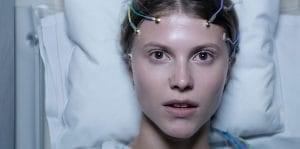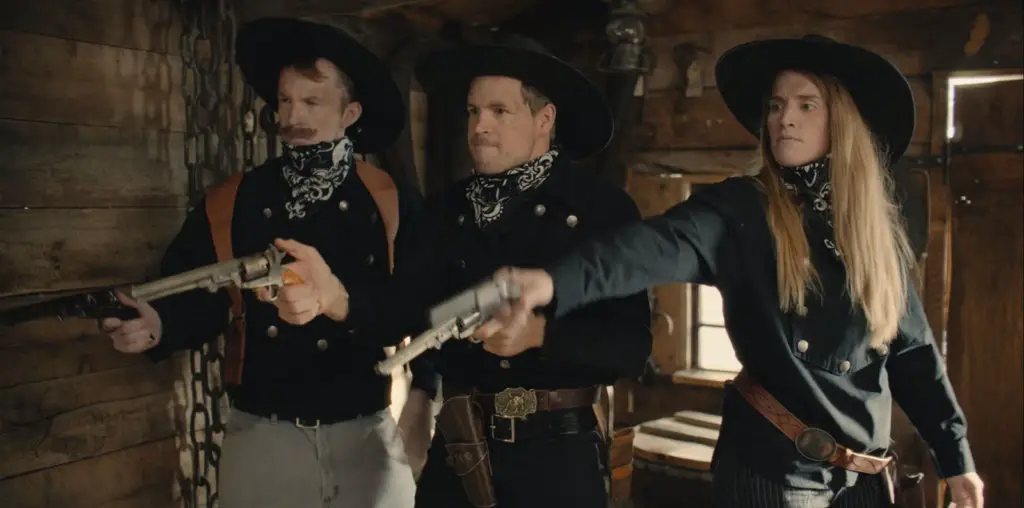
The first minutes of Thelma, Joachim Trier’s first experience on psychological horror-thriller, is enchanting and baffling. Walking on a frozen lake, Trond (Henrik Rafaelsen) and his 8-year-old daughter Thelma (Grethe Eltervag) contemplate the fish swimming underneath the thick layer of ice. They’re crossing the snowy woods that surround their small town located on the west coast of Norway to hunt. A young deer stops, staring in front of them. While Thelma gets petrified, Trond points his rifle at the animal and prepares to shoot. However, and to our surprise, the gun changes direction, aiming at Thelma for brief moments. Standing about seven feet away from him, the kid doesn’t realize that her life is hanging by a thread. This is an enticing premise of a film whose veiled prescription takes a ponderous and valid effect.

“The first minutes of Thelma, Joachim Trier’s first experience on psychological horror-thriller, is enchanting and baffling.”
The story moves onward, and we are taken to the cosmopolitan scenario of Oslo, where the beautiful yet reserved Thelma (Eili Harboe), now a freshman in college, struggles to adapt to a big city and new people. Nevertheless, she shows clear signs of wanting to live an independent life. Sometimes, when not picking up the phone, she gets her overly controlling parents worried. It’s clear that she maintains a close relationship with her father, but he can make her truly uncomfortable with his to-the-point remarks. Her wheelchair-bound mother, Unni (Ellen Dorrit Petersen), despite observant, remains silent most of the time. One can tell there’s pain here, but the mystery stubbornly persists.
The secrets, having had tragic repercussions in the past and within the family, only begin to surface when Thelma, who grew up immersed in a rigid Christian doctrine, is tormented by guilt as she experiences what people at her age are usually exposed to, namely, alcohol, drugs, and sexual desire. On this latter aspect, she gets particularly overwhelmed when in the face of an irrepressible lesbian attraction for Anja (Kaya Wilkins), the extrovert college mate who was sitting next to her in the library when she had the first of a series of weird seizures.

“…possesses a freaking strange power that can be used over people with possibly alarming outcomes.“
These completely strange occurrences along with abominable dreams, occasional panic attacks, and an unrestrained spiral of emotional vulnerability lead Thelma to the fantastic yet intimidating discovery that she possesses a freaking strange power that can be used over people with possibly alarming outcomes. As the sexual repression stings deeper, the main character acknowledges she is special, and yet the film loses a bit of direction after a couple of flashbacks have clarified what she’s really capable of.
Thelma is loaded with invention, but stands below the high standards the director set with top-notch dramas such as Oslo, August 31 and Reprise. If the film is technically unblemished, it’s no less true that it feels a bit strained, story-wise. Notwithstanding, and for his own sake, Trier eschewed any type of melodramatic flourishes and was wise enough to intensify those suspended, dreamlike, and highly atmospheric segments where the senses become affected by the use of substances and the sexual pleasures are set loose. There’s a scene of a party that is absolutely enthralling, and the scintillating Elie Harboe, delivering a standout performance, gives you another good reason to see this movie.

Thelma (2017) – Directed by Joachim Trier. Written by Eskil Vogt and Joachim Trier. Starring: Eili Harboe, Kaya Wilkins, Henrik Rafaelsen, Ellen Dorrit Petersen.
7 out of 10


